2014.09.05 16:35
Why Modern Architecture Struggles to Inspire Catholics
The left church I find more contemplative, catacomb-esque even. The right church I find excessive and un-necessarily busy.
Otherwise:
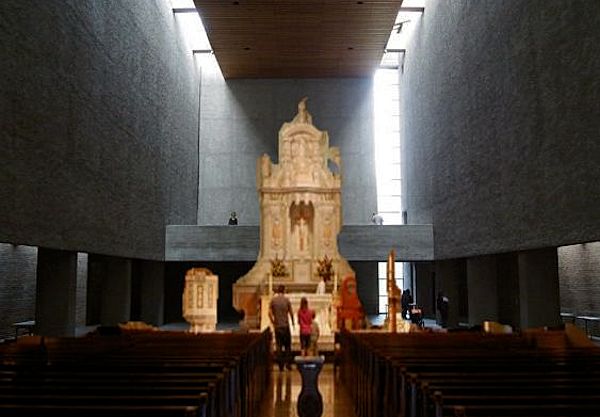
In the future, interpretations of the Third Vatican Council will be famous for fifteen minutes.
2014.09.11 09:45
The End of History?
"Most prevalent in our time: the assimilating imagination, the metabolic imagination."
It's still over a millennium before the osmotic imagination and the electro-magnetic imagination are the most prevalent. Humanity's furthest reach occurs almost exactly the year 4000. But then the ultimate cut-off happens 4371, which ushers in approximately 1780 years of all-frequency imagination. And after that humanity is simply a nimiety of keratin.
2014.09.15 11:52
The End of History?
The point of my [prior] post was to provide an alternative view to 'the end of history', one that sees the end (starting) over 4000 years from now.
The metabolic duality tilts slightly toward the creative, as destructive metabolism--catabolism--harbors some constructive properties.
Overall, I'm referring to stages of human imaginations and not some sort of stages of de-corporalisations.
Coincidentally, I just finished dossier: metabolism metabolic (going back almost exactly 20 years). Some of it seems far-fetched, almost all of it is unpolished, and it's there now to see if an actual working thesis could come out of it.
For me it is indeed strange going back to 1994
2014.09.15 17:41
The End of History?
I honestly don't know if I can answer any of your questions adequately, so whatever I write here now is not to be taken as anything definitive.
The source of the various imaginations comes from the physiological processes that occur within the body. That is to say that the brain acts assimilatingly, or metabolically or osmotically, etc. That's my (short) answer to the origin of the operations. (This is perhaps the most far-fetched conclusion, yet it was learning about the various physiologies of the body and then wondering whether the brain might have the same physiologies that sparked the notion of various human imaginations. Thus, in general, any answers as to origin and to be looked for within the body itself.)
The notion of electro-magnetism and electro-magnetic imagination comes from the notion that the human heart operates as an electro-magnet, and what the heart pumps (blood) is what makes it pump. Is the heart then like a perpetual engine? Interesting, electro-magnetic radiation defines light. Is the electro-magnetic imagination a perpetual beat of light? Who knows?
Since I feel as if my own imagination is slowly showing signs of ossification, meaning pliability has begun to harden, the implication of you're third question is perhaps the best all these notions may ever be useful for, if useful at all. But, then again, the answers really shouldn't come from me, but rather from how the body operates.
2014.09.23 08:45
What do you think of the 2014 Serpentine Pavilion in London?
After reading the above comments, I was reminded of something from 2000.04.06: "So what then is architecture? Is it a hard, 'simple', 'natural' protective shell that engenders the continuation of life? Or is it a soft formlessness forever (re-)designing an applied shell it doesn't naturally have?"
As a temporary pavilion, and indeed one whose purpose is to exhibit (and somewhat test) architectural ideas, it certainly does its job well, and for that I like it. Does it portend a future mainstream trend in building? Probably not, but one really never knows for sure.
Further, I'm now reminded of (the interior of) the small (river?) museum in Louisiana from a few years ago, and also James Stirling's training building for Olivetti with its fiberglas shell.
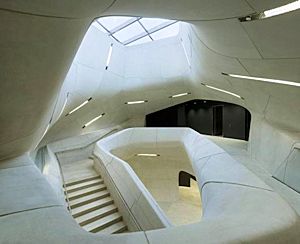 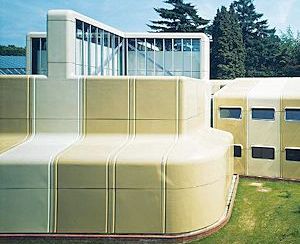
| |
2014.10.04 10:20
Material Witness #5: Cultural Gerrymandering
While O. was writing, I was driving home from a late night viewing of Gone Girl. It was lightly raining and I couldn't remember the last time I drove at night in the rain. Is Gone Girl the same neighborhood as American Beauty 15 years later?
And the night before I was watching August: Osage County--talk about your house with no closets, but lots of skeletons.
Last Monday afternoon, a good bit of a long phone conversation was about the 'obscure' architectural locations of Rome within The Great Beauty, like the apartment within one of the towers of S. Agnes in Agone (which I recognized from a mid-1980s issue of Casa Vogue) and inside the Capitoline Museum at night by candlelight. I forgot to mention the Scala Sancta (which I kind of think was a set rather than the real thing), and have since remembered the Tempietto and the Villa Guilia and Borromini's forced perspective gallery at the Palazzo Spada.
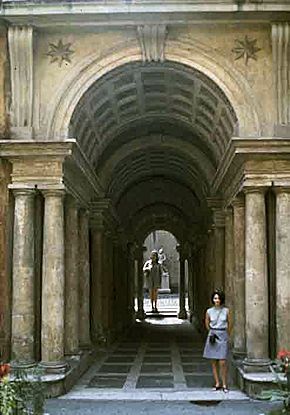
A forced perspective gallery, imagine designing something like that for a palazzo now.
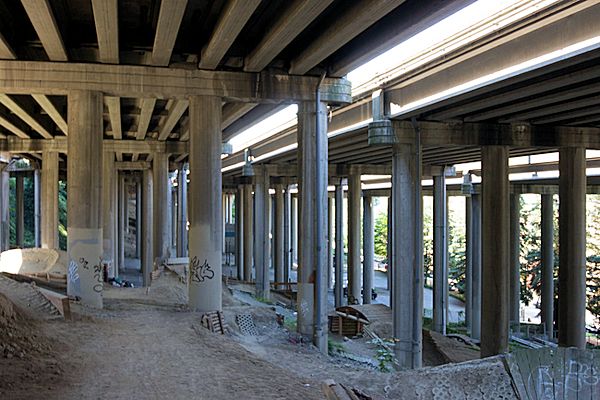
2014.10.04 12:45
I-5 Colonnade Park
Wonder how the columns of 1-5 Colonnade Park compare to the pylons of Gehry's Eisenhower Memorial for Washington DC.
Also note how similar I-5 Colonnade Park is to the socle of OMA's Agadir Hotel and Convention Center (Agadir, Marruecos, design 1990).
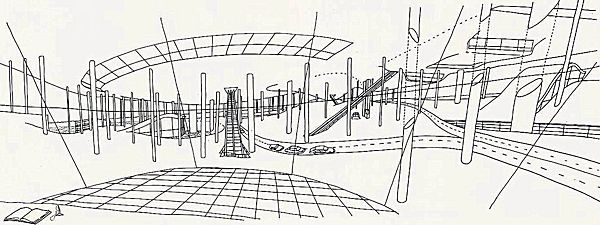 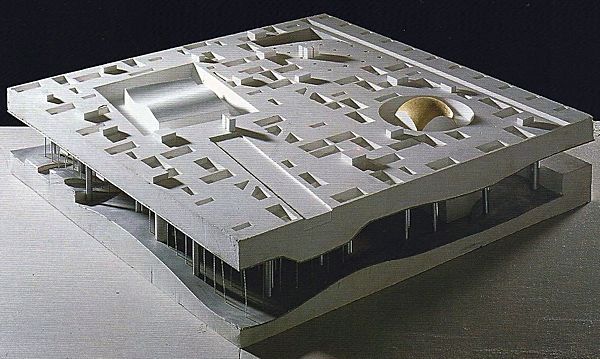 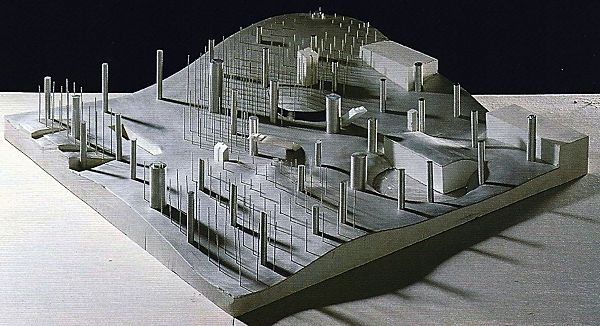
"The landscape which is generated with its concave and convex domes, with the "forest" of columns, its shafts of light, is a modern interpretation of Islamic space--Islam after Einstein relativity--which will also be expressed by materials: polished concrete, mosaic, tiles, etc."
So, is I-5 Colonnade Park also a modern interpretation of Islamic space?
2015.01.26 19:15
Aaron Betsky To Lead Taliesin West
"In the Zeitgeist, everything will be the future."
| |
2015.01.27 09:56
Aaron Betsky To Lead Taliesin West
I'm deeply obsessed with the big, fat columns of the Ralph Jester House (1938). How can you not be?!
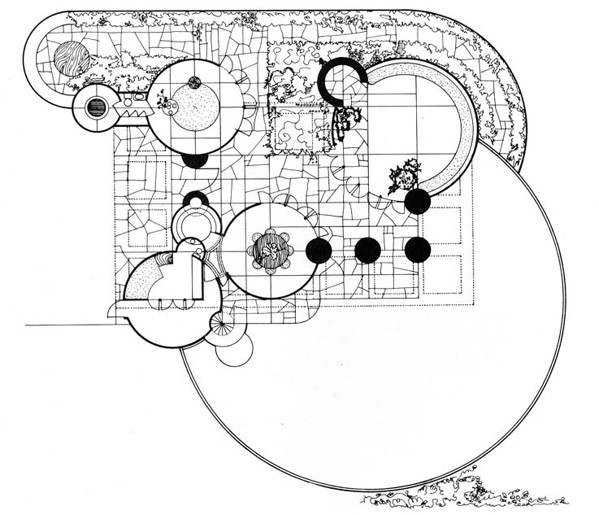
"Such a pattern of curves is wholly new in Wright's architecture and suggests all sorts of possibilities for the future."
Hitchcock, In the Nature of Materials--actually read it sometime.
2015.03.08 11:26
The Battle of the Ancients and the Moderns (sequel #______ )
So what's the battle?
Saying that "we find modernism's inception in the 14th century, or at least sometime during the Enlightenment" is proof of what (victory) exactly?
Perhaps the birth and rise of subjectivity is the real origin of the modern. Or, put better, true modernism is the culmination, or apotheosis even, of the triumph of subjectivity over objectivity.
|